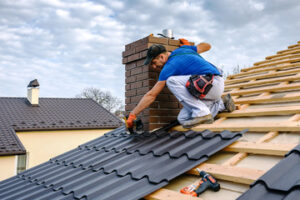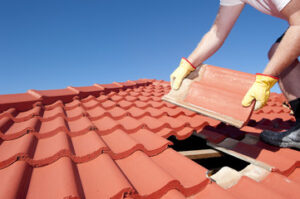When properly maintained, a roof is one of the most important parts of any structure. It protects the occupants of a home or business, keeping them safe and comfortable.

There is more to a roof than meets the eye, however. Understanding roofing basics is essential for homeowners to successfully complete DIY projects and hire reliable roofing businesses. Contact Roofing Contractors Helena MT for professional help.
Ever since mankind started building structures, one of the most important considerations is how to protect people from the elements. Even pre-historic hunters and gatherers sought shelter from rain or snow when going out on longer hunting trips. The first roofing solutions were essentially caves that provided limited protection. As time went by, people began seeking more flexible and practical options. The earliest roofs were simply constructions from whatever materials were available to effectively cover the shelter, and thatching is considered one of the oldest roofing methods. Thatching was a process of using dried vegetation such as straw, reeds, and heather to provide insulation and water-shedding capabilities. The practice became widely used, and lasted for thousands of years until it was replaced by more modern materials like clay and concrete.
Many cultures favored thatched roofing, but others preferred terracotta or marble tiles, especially in the construction of churches. In addition, the Romans perfected concrete, allowing them to construct domed roofs, such as that of the Pantheon.
When modern synthetic roofing products entered the market in the 1960s, it was a game-changer. These new materials were strong, lightweight, and adaptable to different weather conditions. This freed builders from having to work with traditional materials and allowed them to design more creatively.
In the early days of American roofing, wood shingles were popular due to the availability of lumber from local sources. However, this type of roofing was prone to fire damage, and it would require regular maintenance to keep it looking good. Tar paper served as the earliest form of roof protection, but the material was not waterproof and quickly deteriorated when it got wet.
The advent of corrugated iron roofing made it more popular for low-cost and quick building projects such as train sheds and post offices. The ability to galvanize iron made it water-resistant and rust-resistant, which increased its durability. The invention of the rolling mill in the 19th century allowed for mass production of tin-plate iron, which was popular for both residential and commercial roofs. These roofs were often embellished with decorative motifs, as well.
Materials
There are many materials that can be used for roofing. The type of roofing material that best protects a home depends on its design, climate and other factors.
Asphalt shingles are among the most popular roofing choices, because they’re affordable and available in many colors and styles to complement almost any home. They’re also very durable and can withstand high winds, shingle uplift, and heavy snowfall. They are not ideal for cold-weather areas, however, as they can become brittle and susceptible to damage from hail.
Concrete and clay tile roofs are a popular choice in warm-weather climates because they are fire-resistant, energy-efficient and long-lasting. They are not only beautiful but also add a touch of luxury to a home. However, they are quite heavy and are prone to punctures and damage from walking on them. They can also be damaged by severe wind, and if installed over an existing roof, they require special care to prevent damage.
Slate is another natural roofing material, which is characterized by its beauty and durability. It can last for up to 100 years if properly maintained. Despite its longevity, slate is a relatively expensive option, and it requires special skills and expertise to install and repair.
Metal roofing is another popular option. It is highly durable, and it can be designed to resemble other types of roofing materials such as wood or stone. Stainless steel is an example of a metal that can be used for roofing, and it offers a sleek, modern look that is often preferred by homeowners who want to make their homes stand out from the rest.
For flat and low-pitched roofs, membrane roofing is often the most suitable material. It consists of layers of tar and asphalt, which are bonded together using a heat-resistant adhesive called bitumen. This type of roofing is suitable for low-sloped buildings, and it’s especially suited to flat roofs where water drainage is an issue. It’s also a great option for roofs with steep slopes, because it can be adapted to the slope by using underlayments.
Installation
A roof is the main barrier that protects a space from the elements, and its installation must be done correctly to ensure longevity and performance. During the roofing process, the roofer should protect the exposed wood on the roof deck with sheathing, add vents as necessary for proper attic ventilation, and install flashing around chimneys, water heater pipes, wood stove pipe, certain vents, and roof valleys. Lastly, the roofer should install underlayment for added protection and a moisture barrier.
Maintenance
A roof is a complex system of interconnected parts that must be regularly inspected and maintained to ensure the integrity of the building’s structure. A thorough inspection of the shingles and other roofing materials is necessary to identify problems and address them before they can lead to costly repairs. Performing regular maintenance also helps extend the life of the roof and reduces energy costs.
Southern California’s weather conditions present a unique set of maintenance demands, including excessive UV exposure and Santa Ana winds. Regular roof maintenance can help prevent these problems from escalating and save facilities thousands in repair costs.
Perform a visual inspection of the shingles, looking for signs of wear and tear. Identify any areas that are missing or damaged, and note any areas that show signs of moss or algae growth. Ensure that the caulking around chimneys, vent pipes and skylights is intact and free of cracking or openings. Look for flashing that is loose or ill-fitting, as these can allow water intrusion during high wind storms.
Remove Debris
After strong winds and storms, clear debris from valleys and around chimneys. Debris can trap moisture on the roof, promote algae and moss growth, and create pathways for pests. Clearing drains is also important to avoid ponding that can damage the roof and create leaks.
Take pictures of the roof and make a log of any findings. This will be useful when scheduling repair work and keeping track of the results of maintenance. Regular maintenance and inspections can also keep manufacturer and workmanship warranties valid, many of which require documented regular inspections as a condition of coverage.

